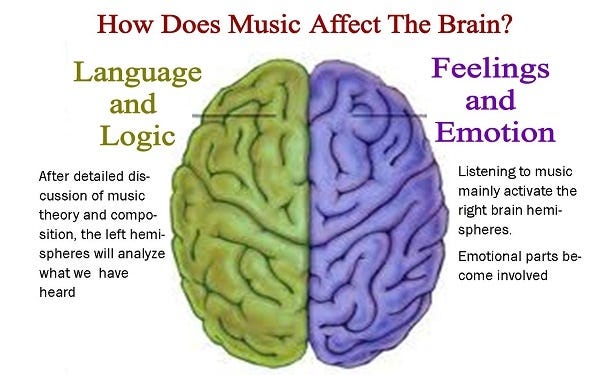Music is an art, entertainment, pleasure, and … medicine for the body and soul. Playing music is one of the few activities that involve using the whole brain. Music is intrinsic to all cultures and has surprising benefits not only for learning language, improving memory and focusing attention, but also for physical coordination and development.
Not all types of music have favourable effects, however. Too loud or too jarring music can be distracting, and can compete for our attention with what we’re trying to do. But for the most part, exposure to music, specifically classics, has beneficial effects:
Music heals

Overall, music does have positive effects on pain management. It can help reduce the sensation as well as distress of both chronic pain and postoperative pain.
It may be difficult to believe, but music can help to reduce pain, chronic actually, resulting from several conditions, like osteoarthritis, disc problems or rheumatoid arthritis, by up to 21%.
Music therapy is increasingly used in hospitals to reduce the need for medication during childbirth, or to decrease postoperative pain and complement the use of anesthesia during surgery.
There are several theories about how music positively affects perceived pain:
- Music produces revulsive effect,
- Music may give the patient a sense of control,
- It causes the body to release endorphins to counteract pain,
- Slow music relaxes by slowing breathing and heartbeat.
* Reducing blood pressure
By listening to the recordings of relaxing music every morning and evening, people with high blood pressure can train themselves to lower their blood pressure and keep it low. This claim is supported by American Society of Hypertension. They reported that listening daily to just 30 minutes of some music genres like classical, almost Baroque music may noticeably lower high blood pressure.
* Medicine for the heart
Music is good for your heart also. In this case, benefits come not from music style, but it’s tempo. Italian and British researchers recruited young men and women, half of whom were trained musicians. The participants listened to six styles of music in headphones, including rap and classical pieces, with random two-minute pauses. As the participants listened to the music, the researchers monitored their breathing, heart rates and blood pressure. Heart and breathing rates were faster when they listened to lively music. And when the musical slowed, so did their heart and breathing rates. Some results were surprising. During the musical pauses, heart and breathing rates normalized or reached more optimal levels. Whether or not a person liked the style of music did not matter. The tempo, or pace, of the music had the greatest effect on relaxation.
* Promotes Post-Stroke Recovery
A daily portion` of one’s favourite pop melodies, classical music or jazz, can speed recovery from debilitating strokes, according to the latest research. When stroke patients in Finland listened to music for a couple of hours each day, verbal memory and attention span improved significantly compared to patients who received no musical stimulation, or who listened only to stories read out loud, the study reports. Besides that, patients with unilateral neglect after stroke may improve their visual attention by listening to classical music.
Another benefit for stroke patients coming from listening to music is that it also promotes fine-grained neuroanatomical changes in the recovering brain.
* Chronic headaches & migraine remedy
Music can help people who suffer from migraines and chronic headaches to reduce the intensity, frequency, and duration of the headaches. It is also well known that music boosts immunity.
Music can boost the immune function. Scientists explain that a particular type of music can create a positive and profound emotional experience, which leads to secretion of immune-boosting hormones. This helps contribute to a reduction in the factors responsible for illness. Listening to music or singing can also decrease levels of stress-related hormone cortisol. And this is significant, because higher levels of cortisol can lead to a decreased immune response.
* The example of Mozart’s effect

Music activates many regions of the brain, including auditory, motor and limbic (associated with emotions). Such widespread activation of brain explains many beneficial emotional and cognitive music effects.
Many German studies, in particular, have succeeded in demonstrating in the case of patients with Alzheimer’s disease that simply listening to music that revived childhood or other memories in their homes brought them back to a normal motor and conscious state for a few minutes. What could only move their loved ones as they saw their fathers and mothers again, finally remembering themselves and being normal for a few minutes… The studies on these patients and on the effects of music on the brain continue to try to determine at the cognitive level how such results can be achieved in geriatrics. It’s really amazing!
Music enhances learning or memory performance.
The idea that music makes you “smarter”received considerable attention from scientists and the media. Listening to music or playing an instrument can actually make you learn better.And research confirms this.
Music has the power to enhance some kinds of higher brain function:
The famous “Mozart effect”:

In fact, music improves memory performance.
The power of music to affect memory is quite intriguing. Baroque and Mozart’s music, with a 60 beats per minute beat pattern, activates the left and right parts of the brain. The simultaneous left and right brain action maximizes learning and retention of information. The information being studied activates the left brain while the music activates the right brain.
Also, activities which engage both sides of the brain at the same time, such as playing an instrument or singing, cause the brain to be more capable of processing information.
Listening to music facilitates the recall of information. Researchers have shown that certain types of music are a great “keys” for recalling memories. Information learned while listening to a particular song can often be recalled simply by “playing” the songs mentally.
Musical training has even better effect than just listening to classical music. There is clear evidence, that children who take music lessons develop a better memory compared with children who have no musical training.
Note: For learning and memory performance improvement, it’s important listen to music without a vocal component. Otherwise you’re more likely to remember the words of the background song than what you’re supposed to be recalling.
* Music improves concentration and attention
Music that is easy to listen to or relaxing classics improves the duration and intensity of concentration in all age groups and ability levels. It’s not clear what type of music is better, or what kind of musical structure produces the best results, but many studies have shown significant effects.
Music improves physical performance

* Athletic performance
It is clear that when I go to my fitness session sometimes even running, the first reflex I have is to put on dynamic music, whatever the trend, as long as it motivates me and helps me to surpass myself. I even went home to get my headphones because otherwise my fitness session would be pathetic. In this case, when we talk about “athlete”, it is not surprising to see what the studies have concluded:
Choosing music that motivates you will make it easier to start moving, walking, dancing, or any other type of exercise that you enjoy. Music can make exercise feel more like recreation and less like work.
Furthermore, music enhances athletic performance!
Anyone who has ever gone on a long run with their iPod or taken a particularly energetic spinning class knows that music can make the time pass more quickly.
The four central hypotheses explaining the mechanism how music facilitates exercise performance:
- Reduction in the feeling of fatigue,
- Increase in levels of psychological arousal,
- Physiological relaxation,
- Improvement in motor coordination.
* Body movement and coordination
Musical rhythm has the remarkable ability to move our bodies. Music reduces muscle tension and improves body movement and coordination. Music may help in developing, maintaining and restoring physical functioning in the rehabilitation of persons with movement disorders.
Music helps to work more productively

* Fatigue fighter
Listening to upbeat music can be a great way to find some extra energy. Music can effectively eliminate exercise-induced fatigue and tiredness caused by monotonous work.
Keep in mind that listening to too much pop and hard rock music can make you more jittery than energized. Vary what you listen to and find out what type of music is the most beneficial for you. You could try classical music one day, pop the next day and then some jazz.
* Music improves productivity
It is clear that as I told you, I listen more to hard rock music during fitness, classical or Buddhist music during my readings and finally classical music or rock music that I have been listening to for 15 years when I want to start writing to you and find ideas without any inconvenience… that can be disastrous 😉 But this is another story… of taste!
Many people like to listen to music while they work and I am certainly one of them. How about you? Did you know you can perform better at your work with music?
Whilst there may be many reasons for wishing to listen to music in the workplace, it really improves your productivity!
According to a report in the journal Neuroscience of Behavior and Physiology, a person’s ability to recognize visual images, including letters and numbers, is faster when either rock or classical music is playing in the background.
Music calms, relaxes and helps to sleep

Relaxing classical music is safe, cheap and easy way to beat insomnia.
Many people who suffer from insomnia find that Bach music helps them. Researchers have shown that just 45 minutes of relaxing music before bedtime can promote a restful night.
Relaxing music reduces sympathetic nervous system activity, decreases anxiety, lowers blood pressure, slows down heart and respiratory rate, relaxers muscles, and helps to distract from thoughts.
Almost, music reduces stress and aids relaxation
Listening to slow, quiet classical music, is proven to reduce stress.
Numerous studies and experiments have shown that anyone can experience relaxing effects of music, including newborns.
One of the unique benefits of music as a stress reliever is that it can be used while you do your normal daily activities, so that it really doesn’t take extra time.
How does the music reduce stress?
- Physical relaxation. Music can promote relaxation of tense muscles, enabling you to easily release some of the tension you carry from a stressful day.
- Aids in stress relief activities. Music can help you get “into the zone” when practicing yoga, self hypnosis or guided imagery, can help you feel energized when exercising and recover after exercising, help dissolve the stress when you’re soaking in the tub.
- Reduces negative emotions. Music, especially upbeat tunes, takes your mind off what stresses you, and promotes optimistic and positive feelings. And this helps release stress and can even help you keep from getting as stressed over life’s little frustrations in the future. In fact, music can decrease the amount of the cortisol, a stress-related hormone produced by the body in response to stress.
Also published on Medium.
